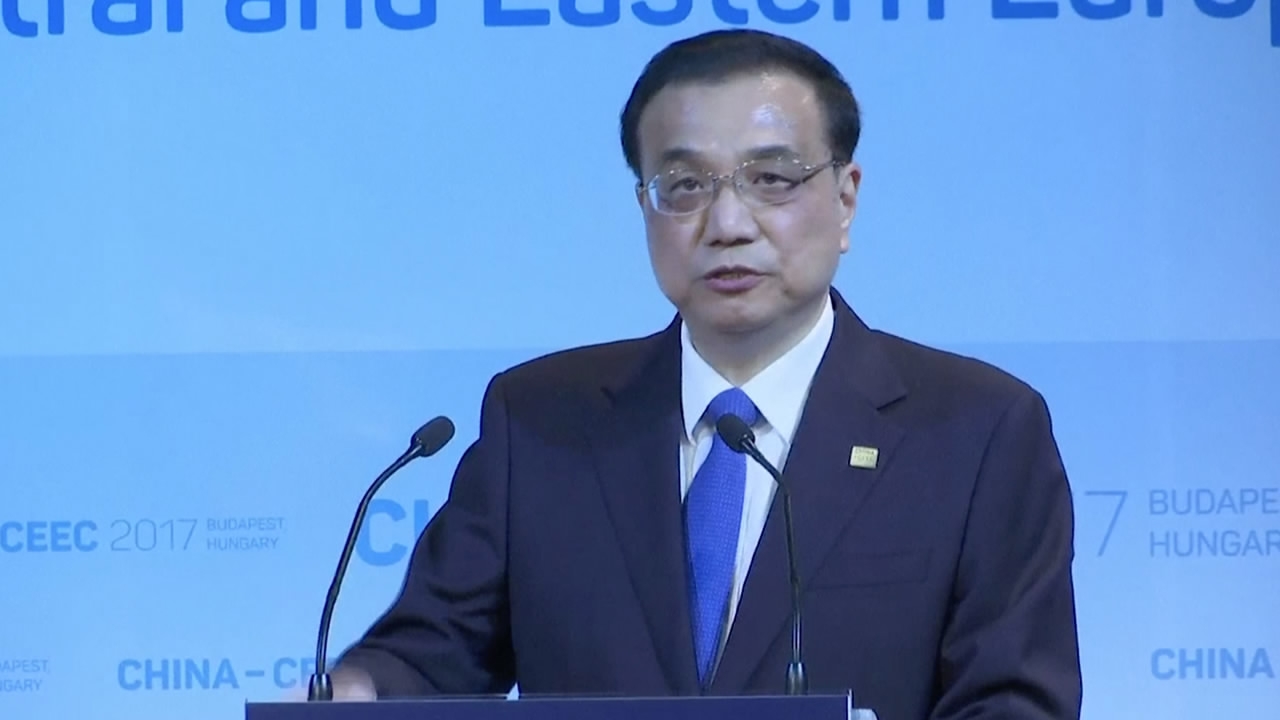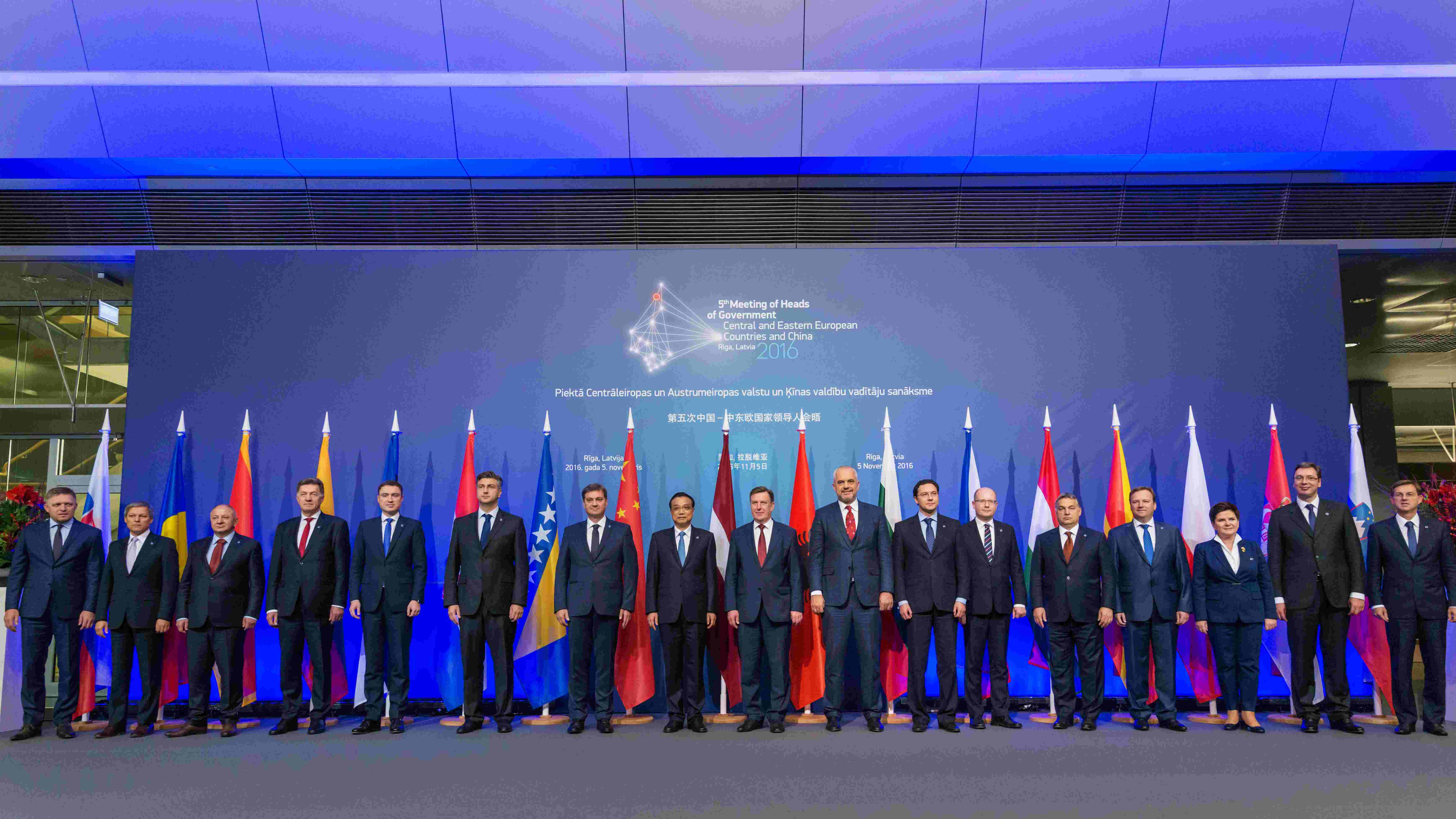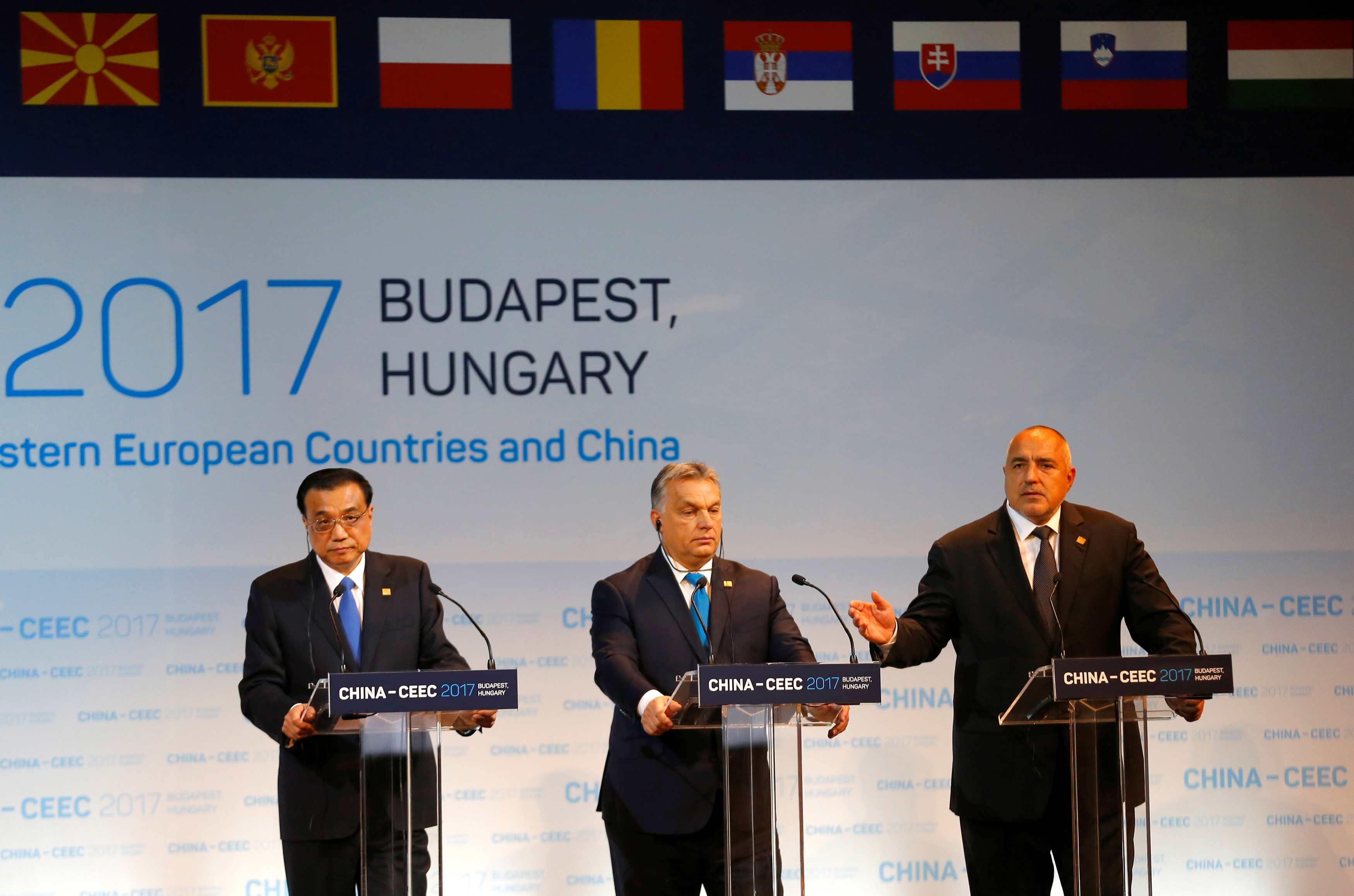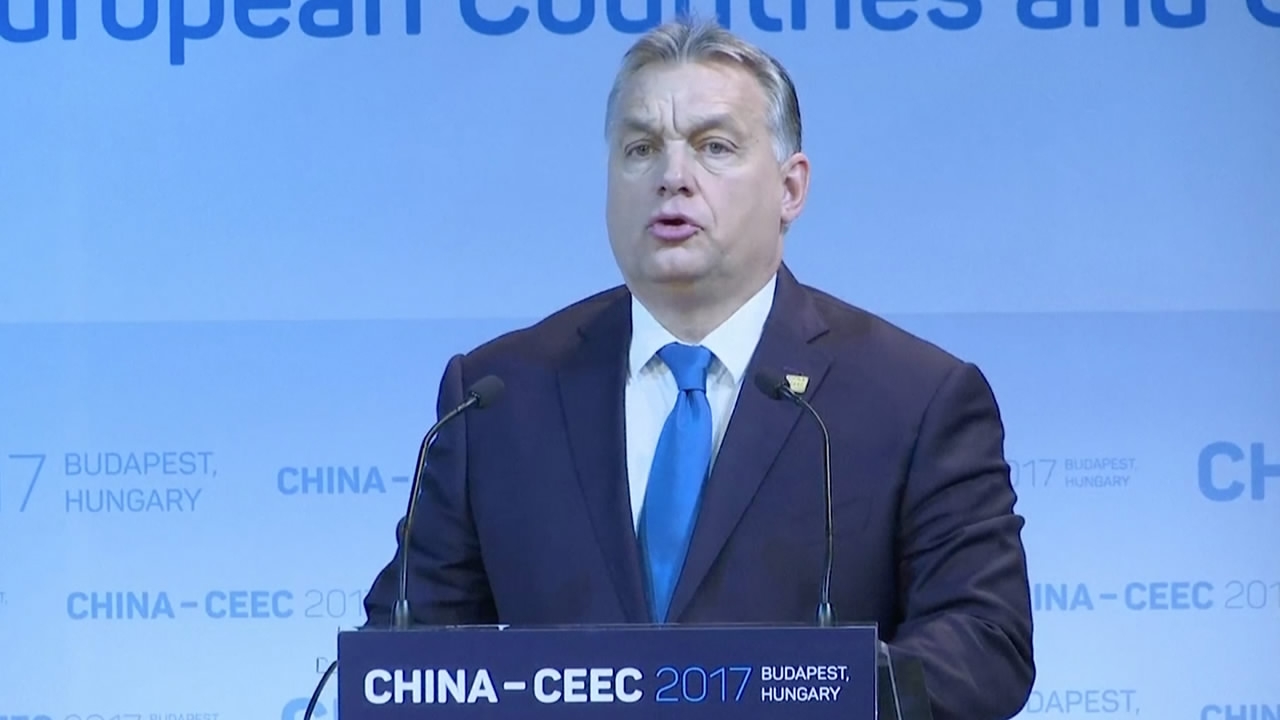
China
18:00, 28-Nov-2017
Why is Western Europe anxious about China's CEEC outreach?
By Abhishek G Bhaya

As China expands its political and economic engagement with the Central and Eastern European Countries (CEEC), some European Union members – particularly from Western Europe – are increasingly anxious about Beijing taking advantage of the union’s weakened position amid rising east-west friction.
The assertion from Hungary's prime minister – that a new world order is taking shape in which China and Asia will play a more prominent role – has further ruffled feathers in those nations which have benefited from a Western-dominated global order.

Leaders from China and CEE countries pose for a family photo in Hungarian capital Budapest on November 27, 2017. /Photo via China-CEEC
Leaders from China and CEE countries pose for a family photo in Hungarian capital Budapest on November 27, 2017. /Photo via China-CEEC
London-headquartered international daily The Financial Times ran a report headlined “Brussels rattled as China reaches out to eastern Europe” on Monday – the very day on which the sixth summit of China-CEEC 16+1 was inaugurated in the Hungarian capital Budapest.
Stressing that the 16+1 grouping receives “caustic reviews” in leading EU capitals, the FT report said that diplomats fear “it could be exploited by Beijing to undermine union rules and take advantage of growing east-west tensions in the pact itself.”
"This sub-regional [16+1] approach is meeting a great deal of suspicion not only in [EU headquarters] Brussels but also in the capital of many member states," FT quoted a European diplomat as saying.
“The [16+1 is] dealing with many things. Some of them are touching on EU competences, or they are going into new areas where there are already initiatives between the EU and China. And we only see the tip of the iceberg,” another senior European diplomat told FT on the condition of anonymity.
The report cites two key concerns among the anxious lot. “The first is that China may intensify efforts to use the influence it is building in central and eastern Europe to frustrate aspects of the EU’s common China policy. The second is that some 16+1 countries may exploit strong ties with China to buttress negotiating positions against Brussels.”
China: Europe important for world stability

Chinese Premier Li Keqiang, Hungarian Prime Minister Viktor Orban and Bulgarian Prime Minister Boyko Borisov attend the China-CEEC Economic and Trade Forum in Budapest, Hungary, on November 27, 2017. /Reuters Photo
Chinese Premier Li Keqiang, Hungarian Prime Minister Viktor Orban and Bulgarian Prime Minister Boyko Borisov attend the China-CEEC Economic and Trade Forum in Budapest, Hungary, on November 27, 2017. /Reuters Photo
China has constantly allayed such nervousness among some of the European countries. Delivering the keynote address at the opening ceremony of the forum, Chinese Premier Li Keqiang reiterated Beijing’s position that sees Europe as an important player in maintaining global stability.
"Our cooperation is based on mutual respect and treating each other as equals. It is China's consistent view that Europe is an important force for upholding world peace and development. We would like to see a prosperous and stable Europe. China also supports members of CEE countries to join the EU and respect their wish to take part in other international organizations or take part in other regional cooperation arrangements," Li said.
The Chinese premier emphasized that his country’s increased cooperation with central and eastern Europe is part of the process of expanding globalization that will unite the two ends of the Eurasian landmass.
Speaking to over 1,000 entrepreneurs from China and the CEEC at the event, Li called for efforts to accelerate the building of connectivity projects such as the Hungary-Serbia railway and promote the healthy development of China-Europe freight train services.
In a sign that such connectivity projects are on track, coinciding with the China-CEEC summit launch, the Xiang Ou Express freight train set out on its return journey on Monday from Budapest to Changsha, the capital of central China’s Hunan Province, carrying a plethora of products from Hungary and its neighboring countries. Earlier this June, the train had arrived on its inaugural journey from Changsha with Chinese goods.
One of the main takeaways from Li’s speech was the announcement of the establishment of the China-CEEC Inter-Bank Association – for which China Development Bank will provide an equivalent amount of two billion euros (2.4 billion US dollars) as development-oriented financial cooperation loans – and the second phase of China-Central and Eastern Europe Investment Cooperation Fund.
Beijing is seeking to significantly raise its stake in development and investment projects as well as increase trade volume in the region under the China-proposed Belt and Road Initiative (BRI).
“In the next five years China wants to import goods worth five trillion US dollars. Our investments will total 700 billion US dollars. That is naturally coupled with appropriate reserves and a stable currency that is at an acceptable level despite volatility in international markets," Li announced.
Hungary: China key as new world order takes shape

Hungarian Prime Minister Victor Orban, host of the 16+1 summit and one of the most vocal proponents of stronger ties with China, emphasized that CEEC needed more external technological and financial resources for future growth.
"The sources from Europe are not enough anymore in themselves, therefore we welcome the fact that as part of the new economic world system China looks to this region whose development it wishes to take part in,” said Orban.
Referring to the China-financed reconstruction of railway line between Budapest and the Serbian capital of Belgrade as a "flagship project" of China's increased presence in the region, Orban said: “We have considered the main projects where this cooperation is expressed. The flagship among these is the modernization and development of the Budapest-Belgrade railway line which, as part of the 'one region, one way program' will have a strategic importance for the Silk Road transport in the future."
China's "new Silk Road" initiative to expand trade across Asia, Africa and Europe is one of the key themes of the sixth edition of the annual China-CEEC meeting this year.
The Hungarian leader, who has often been at odds with Brussels over a range of issues, is vehemently pushing an “Eastern Opening” policy for his country – looking to increase trade with China and Asia while portraying Western Europe as economically weakened and with a declining global standing – which has irked some of his EU partners.
On Monday, Orban spoke about the emergence of a new world order. "We have reiterated the realization that around us there is a new world order taking shape both in politics and economy and the role of Asia and China in this has grown significantly and it is set to grow in the future. Both in terms of finance and technology they have become a decisive force. Central Europe welcomes this development," he said.
While that assertion may alarm some EU partners, Bulgarian Prime Minister Boyko Borisov underlined that China’s outreach and engagement in the region will only strengthen global peace.
"China is putting a great effort into not only opening its market but also to contributing to joint projects which are not only practical but also contribute to global peace," he said.
Palpable anxiety
As Beijing widens economic ties with CEEC members, there’s a palpable anxiety among critics who tend to argue that Chinese presence is not just about trade and investment but about Beijing wanting to wrest influence away from the EU.
Earlier this August, German Vice-Chancellor and Foreign Minister Sigmar Gabriel urged Beijing to respect the concept of “one Europe” saying: “If we do not succeed for example in developing a single strategy towards China, then China will succeed in dividing Europe.”
Expressing her shock at the statement, China's Foreign Ministry spokeswoman Hua Chunying retorted by asking Gabriel to clarify what he meant by "one Europe."
"We hope and believe his remark about China's attempt to split Europe does not represent most European people's thinking," she said.
(With inputs from agencies)
7347km

SITEMAP
Copyright © 2018 CGTN. Beijing ICP prepared NO.16065310-3
Copyright © 2018 CGTN. Beijing ICP prepared NO.16065310-3